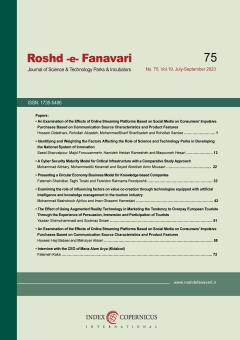-
-
List of Articles
-
Open Access Article
1 - Designing a Digital Entrepreneurship Model for Knowledge-Based Companies with Grounded Theory Approach
HOSSEIN Dide Khani Rohollah Alizadeh mohamad sharif sharifzadeh Rohollah samiee, -
Open Access Article
2 - Identifying and Weighting the Factors Affecting the Role of Science and Technology Parks in Developing the National System of Innovation
saeid shavvalpour majid forouzanmehr Hamideh Heidari Ramsheh Masoumeh Hesari -
Open Access Article
3 - A Cyber Security Maturity Model for Critical Infrastructures with a Comparative Study Approach
Mohamad Akhtari mohammadali keramati seyed abdolah amin mousavi -
Open Access Article
4 - Presenting a circular economy business model for knowledge-based companies
Fatemeh Shahdkar taghi torabi Fereydoon Rahnama Roodposhti -
Open Access Article
5 - Examining the role of influencing factors on value co-creation through technologies equipped with artificial intelligence and knowledge management in the tourism industry
Mohammad bashokouh Iman Ghasemi hamedani -
Open Access Article
6 - The effect of using augmented reality technology in marketing the tendency to overpay European tourists through the experience of persuasion, immersion and participation of tourists
Yazdan Shirmohammadi sinaei sinaei -
Open Access Article
7 - An examination of the effects of online streaming platforms based on social media on consumers' impulsive purchases based on communication source characteristics and product features
Hossein Hajibabaei Mahziyar Akbari
-
The rights to this website are owned by the Raimag Press Management System.
Copyright © 2017-2026







